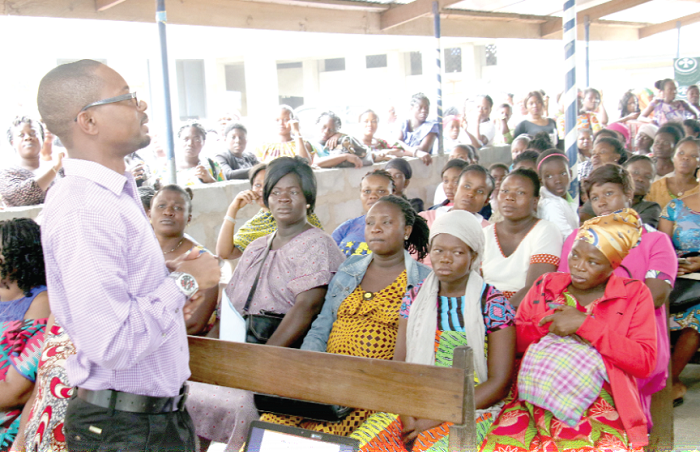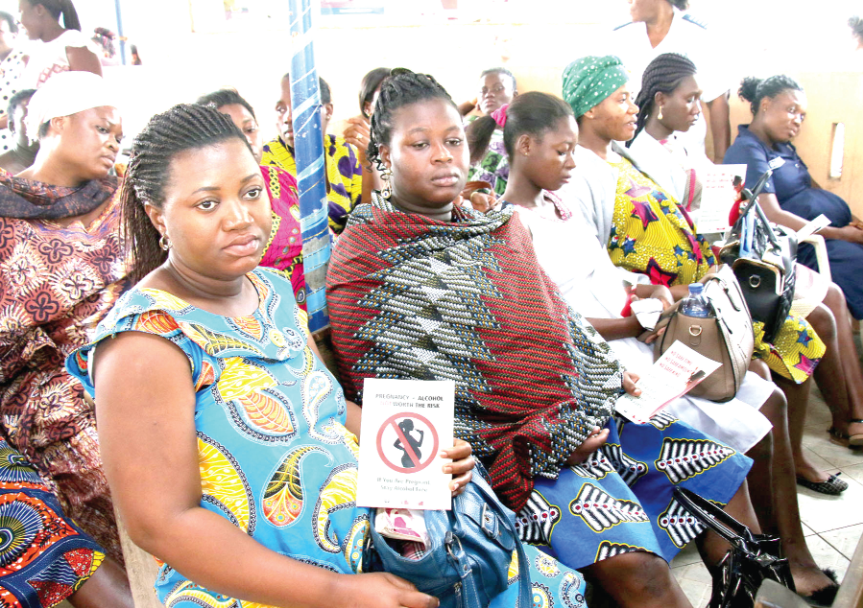
Accra Brewery impacts lives through Alcohol and Pregnancy Programme
Every year on September 9, International Foetal Alcohol Spectrum Disorders (FASDs) Awareness Day is observed across the globe and proclamations are issued to help focus attention on the subject.
Advertisement
Bells are rung at 9:09 a.m. in every time zone from New Zealand to Alaska, and people gather for events to raise awareness of the dangers of drinking alcohol during pregnancy and the plight of individuals and families struggling with FASDs.
At the forefront of the drive to educate people on the dangers of consuming alcohol while pregnant or preparing for it in Ghana is Accra Brewery Limited (ABL), a company committed to ensuring every experience with alcohol is a positive one.
FASDs refer to a group of conditions characterised by facial deformities, behavioural and learning problems that occur in persons whose parents, especially their mothers, consumed alcohol while pregnant or preparing for pregnancy.
Harrowing stories are often recounted of babies delivered with facial deformities such as cleft palate. While this particular deformity can be surgically corrected, the emotional and physical scars remain as reminders of an imperfection caused by parents’ ignorance of the consequences of alcohol consumption before and during pregnancy.
Of much concern, however, are the other conditions that befall victims of FASDs; those conditions that are irreparable and confine these innocent ones to lives unliveable; lives marred by crippling behavioural and cognitive disorders.
Alcohol and Pregnancy Programme
Determined to reach as many women as possible, ABL has gone to work to sensitise women to the dangers of alcohol consumption during pregnancy through its Alcohol and Pregnancy Programme.
Now in its fourth year, the programme has impacted the lives of over 3,000 women and it forms part of the company’s wider efforts at promoting smart drinking.
Outpatient Departments (OPDs) in major health facilities across the country, including the Korle Bu Teaching Hospital, 37 Military Hospital, Adabraka Polyclinic, Police Hospital, Kaneshie Polyclinic and Koforidua General Hospital, are partners in the initiative.
This month, ABL is once again partnering the Public Health Department (Antenatal) of the Police Hospital in Accra to reach the vulnerable.

History
The first FASD Day was celebrated in 1999. The day was chosen to remind the world that during the nine months of pregnancy, a woman should abstain from alcohol. That notwithstanding, anytime is a good time to raise awareness of FASD.
There is strong scientific evidence that heavy drinking during pregnancy can permanently damage the cells of the growing foetus and the baby’s nervous system. This possibly leads to the development of Foetal Alcohol Syndrome (FAS) with challenges ranging from learning difficulties and social integration problems to physical birth defects.
When a pregnant woman drinks, alcohol is carried through her bloodstream, through the placenta and into the foetus’ blood. This can affect the development of the foetus and bring about FASD which refers to a broad range of birth defects, including FAS.
ABL’s commitment
It is important to note, however, that not all women who depend on or abuse alcohol give birth to children with FAS. Other factors such as diet, age, smoking and illicit drug abuse have been associated with congenital abnormalities.
Apart from FAS, drinking during pregnancy can cause other foetal conditions such as heart and kidney defects, hearing and sight impairment, as well as brain and central nervous system dysfunctions.
While ABL seeks to ensure that its alcoholic drinks don’t negatively impact babies during and after pregnancy, the company is looking much further afield to ensure that no pregnant woman suffers ill consequences from any type or source of alcohol consumption.
Under ABL’s Alcohol and Pregnancy Programme, expectant mothers are taken through topics such as the effects of alcohol on the mother and the unborn child, as well as its effects on the development of the foetus.
Experiences
Lily Danso, a 32-year-old self-employed mother of three and programme beneficiary, expressed gratitude for the wealth of knowledge she had gained on alcohol and pregnancy and advised other women to desist from the habit.
“A lot of women are unaware of the effects alcohol consumption can have on the foetus. On the day of the programme, some of them asked if it was fine to drink something before eating while pregnant. The programme must continue because there are many ignorant women out there who need to be reached,” Lily said.
Irene Hada, a housewife who attended antenatal sessions at the Tema General Hospital for her second child, confessed that while pregnant, she was tempted to drink alcohol. She stated that had it not been for her exposure to the consequences of alcohol consumption during pregnancy as a result of the programme, she would have taken alcohol.
Aisha Iddrissu, who had her first child at the age of 29, doesn’t take alcohol for religious reasons. However, seeing a woman who drank heavily give birth to a physically deformed baby profoundly affected her. She says the frequent attribution of such deformities to curses, which diminishes the negligence of the alcoholic mother, bothers her.
Healthcare professionals are also highly appreciative of ABL’s efforts. A Senior Staff Midwife at the Tema General Hospital, Christiana Afful-Akonnor, said alcohol consumption during pregnancy was a major challenge hampering efforts at meeting maternal and infant mortality goals.
She advocated the continuous education of pregnant women, especially in the marketplace and churches, on the negative effects of alcohol consumption.
Erroneous impression
According to the midwife, experiences gathered over the years from dealing with pregnant women indicated that some erroneously believed consuming alcohol enabled them to eat well. To her, ABL’s effort was helping to erase such notions and save lives.
The company’s Alcohol and Pregnancy Programme touches participants. It shows women the disastrous effects alcohol consumption can have on their foetuses and empowers them to be resolute in their convictions to avoid self-destructive tendencies and for that, they are thankful.



